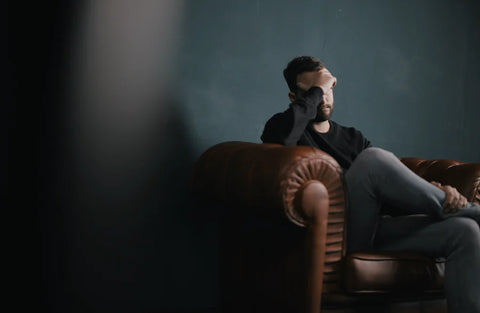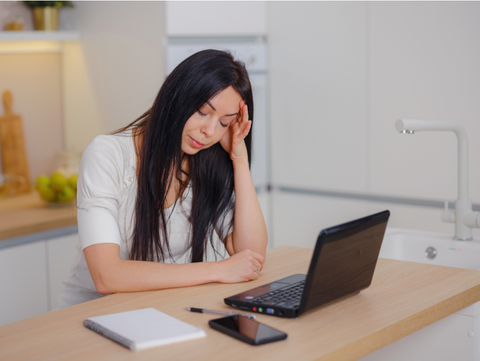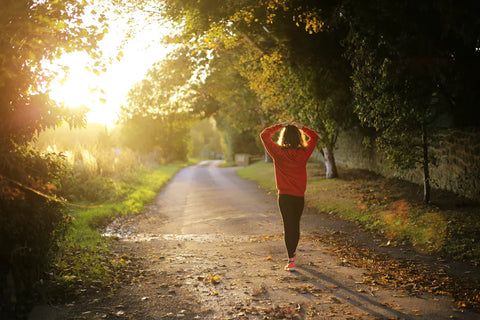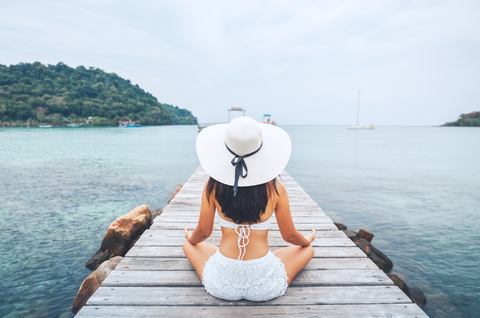Can Anxiety Cause Dizziness?
As an anxiety specialist and therapist, I was recently asked if anxiety can cause dizziness, so I address the question here.
Anxiety affects millions of people worldwide, and it can manifest in various ways, including racing thoughts alongside physical sensations.
What Does Dizziness Feel Like?
There is often a feeling of light-headedness alongside a feeling of spinning or swaying, even when we are standing totally still. The spinning feeling comes from within us, and it can feel quite unsettling.
There is good news however because anxiety and its symptoms are very manageable.

Is There A Connection Between Anxiety And Dizziness?
Understanding the connection between anxiety and dizziness is the first step towards finding relief.
By using the following strategies, alongside seeking professional support (when necessary) to understand and eliminate the root cause of your anxiety, you can take back control and reduce the impact of dizziness on your life.

Why Do We Feel Anxious In The First Place?
Anxiety is our natural response to danger. Our bodies are amazing with how we responds to stress and that feeling of fear. When we encounter a threat, whether real or imagined, our "fight or flight" response is instantly activated within our sympathetic nervous system, automatically preparing us to either confront the threat (fight) or escape from it (flight).
This all happens instinctively, we don't need to stop and think!
This anxiety response produces physiological changes in your body too.
What Are Anxiety Symptoms?
Our heart rate increases along with our blood pressure, and we will experience stronger heart contractions as blood is redirected to large muscles such as our legs. Our muscles become tense, as a way of guarding against potential pain and injury, and preparing you for action. This is because from an evolutionary perspective, fear and danger were often in the form of a wild animal (or wild human!) wanting to attack us.
If it wasn't for anxiety, we would not have survived as a species, so its pretty clever, right!
Stress and anxiety also constrict our airway which leads to a shortness of breath and rapid breathing. You will notice that your breathing is high up in your chest (whereas, when we are relaxed, we breathe deeper and lower into our abdomen). This reduces the levels of carbon dioxide in our blood.
When anxious, we also release hormones, which include cortisol and adrenaline.
These physical changes in our body can lead to that feeling of dizziness, light headedness, nausea and a tingly feeling in our hands and feet.
For some people, their anxiety and dizziness can intensify to the point that they experience panic attacks.

What Happens After A Panic Attack?
The good news is that when the threat is over, our parasympathetic nervous system - this is our rest and digest response, the opposite to fight and flight - prepares our body to recover and thankfully everything returns to normal, known as homeostasis.
That said, anxiety and feeling faint or dizzy is not a pleasant experience. As soon as we feel dizzy, our anxiety is likely to increase even more as we then become fearful of falling and hurting ourself, or embarrassed about drawing attention to ourself.
Anxiety and dizziness can often be treated together when they are connected, and there are effective strategies to help manage and alleviate these anxiety symptoms:

Click the button to book a free Consultation Call
Strategies To Alleviate and Ease Anxiety Symptoms
Breathing Exercises for Anxiety Relief
Practicing deep breathing techniques can help calm your nervous system and activate your parasympathetic nervous system, your “rest and digest” response, the opposite of our “fight and flight” response.
Slow, deep breaths can regulate your heart rate and reduce dizziness. There are plenty of different exercises that you can try, so find the right one for you.
Breathe deeply in through your nose and feel your tummy expand as you inhale. Exhale gently through your nose and feel you tummy return to normal.
If possible, let your exhale last slightly longer than your inhale. I have included some links to some videos on breathing exercises at the end of this article.

Mindfulness and Meditation to Ease Anxiety
Both mindfulness and meditation can help us stay grounded and centred, reducing the likelihood of feeling dizzy.
Mindfulness is all about staying in the present moment. The goal is not necessarily to get rid of all thoughts, but to observe what is going on without judgement, to notice the thoughts and show compassion and kindness towards yourself.
Mindfulness is a practice and a way of living, and we can embrace it in every moment of our lives. It is thousands of years old and has been scientifically shown to influence our health, relationships, wellbeing and happiness.
Sometimes, we can be put off meditations and mindfulness because we believe it is too tricky, but we can all do it so it is worth persevering as the benefits of quieting our minds are huge.
Again, I have included some links to help and guide you, at the end of this article.

Muscle Relaxation Exercises to Reduce Anxiety
Progressive muscle relaxation techniques work because they release the physical muscle tension we feel in our bodies when we are anxious. This is the tension that builds up as part of our natural fight or flight response to danger.
This exercise involves tensing or squeezing different muscle groups as you take a deep breath in, and then releasing and relaxing your muscles as you slowly breathe out. If you feel more tension in a specific part of your body, then you can repeat the exercise several times in this particular area.
To practice muscle relaxation, start by taking a long deep breath in and out, and on the next breath in, tense the muscles in your toes by squeezing them tight, and then relax your toes with your outbreath.
Move on up to your calf muscles, breathe in and squeeze. Then release.
Then your thighs, tighten the muscles as you breathe in, then breathe out and release.
Do the same with your glutes, breathe in and tense these muscles, then breathe out and release.

Continue moving up your body to your tummy muscles, breathe in and tense your muscles, breathe out and release.
Next tense your shoulders, and release them.
Follow with your arm muscles and squeeze your hands into fists. As you breathe out, relax and let the tension go.
Next, bring your attention to your facial muscles, around your eyes and jaw, and scrunch your face up on the in breath, and relax on the outbreath.
Lastly tense your entire body, feel the tension, and then release on a big long sigh.
Relax and let go, and notice how much calmer you feel.

Gratitude and Journalling for Anxiety Relief
Practicing gratitude reduces stress and anxiety, and instead promotes more positive emotions.
To practice gratitude, think about something or someone you are grateful for. It could be as simple as a hot cup of tea, a conversation with a friend, a good book or a cuddle with a pet.
Focus on this feeling of gratefulness and let it wash over you for several minutes. You can repeat this with as many things as you want, until you feel calmer.
Journalling involves writing down your thoughts and feelings. This can help to get them out of your head and onto paper. Writing stimulates the part of your brain that shuts down when you feel anxious, our frontal lobe, thus activating this area sends signals to your brain that you are calm again.

Click the button below to book a Free Consultation call
Physical Activity Is Great for Releasing Anxiety Hormones
Regular exercise is also an excellent way to reduce anxiety and its physical symptoms, including dizziness, as your body releases endorphins which gives you that feeling of euphoria to mask any pain you may experience with “fight or flight”.
Avoid Stimulants such as coffee and alcohol and ensure you stay hydrated, as dehydration can exacerbate feelings of dizziness.
Disclaimer: If you are experiencing anxiety and dizziness, your dizziness could be a symptom of a physical health condition, so it is always recommended that you seek medical advice to determine its cause.

If You Need Further Support With Anxiety
If you need further support to overcome your anxiety and the accompanying symptoms, a trained Anxiety Specialist can prescribe a personalised plan to help you understand the underlying cause of your anxiety, as well as help develop healthy coping strategies that are focused around your individual needs.
Taking care of your mental wellbeing is an essential part of your overall well-being. Left unresolved, anxiety can spiral out of control and have a significant impact on relationships, work, school and family life.
So if you want to take the next steps to have a happier life where your fears no longer hold you back, click the link below and book a free no obligation consultation call.

Click on the button to book a call with an anxiety therapist
Additional Resources to Ease Anxiety
Read What Causes Anxiety?
Read What Are The Different Types of Anxiety?
Read Can Mindfulness Help with Anxiety
Watch How to Feel Less Anxious
Watch How To Reduce Anxiety Immediately
Watch Breathing Techniques for Anxiety
Download Circle of Control and Influence worksheet
Download Cognitive Distortions worksheet
Click on the button to book a call with an anxiety therapist




